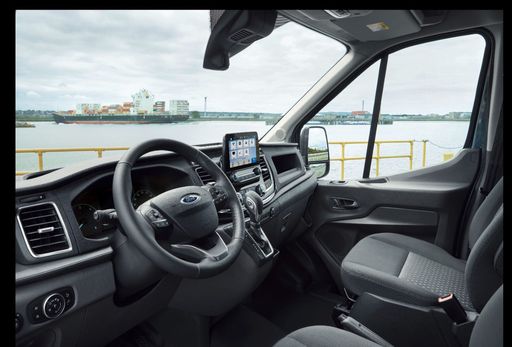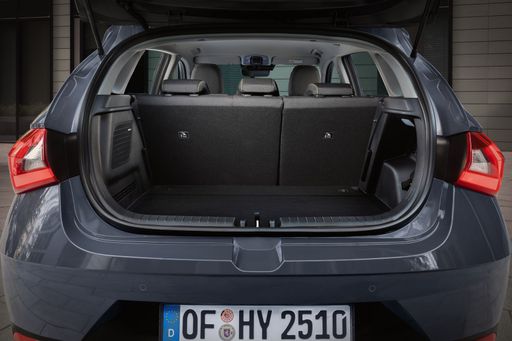Ford Transit Connect VS Hyundai i20 – Specs, Efficiency & Price Comparison
Find out now which car fits your needs better!
The Ford Transit Connect (Cargo Van) is powered by a Diesel or Plugin Hybrid engine and comes with a Manuel or Automatic transmission. In comparison, the Hyundai i20 (Hatchback) features a Petrol MHEV or Petrol engine and a Automatic or Manuel gearbox.
When it comes to boot capacity, the Ford Transit Connect offers , while the Hyundai i20 provides 352 L – depending on what matters most to you. If you’re looking for more power, you’ll need to decide whether the 150 HP of the Ford Transit Connect or the 100 HP of the Hyundai i20 suits your needs better.
There are also differences in efficiency: vs 5.20 L. In terms of price, the Ford Transit Connect starts at 26200 £, while the Hyundai i20 is available from 17400 £.
Compare all the key specs now and find out which model fits your lifestyle best!
Ford Transit Connect
The Ford Transit Connect is a versatile compact van that seamlessly combines functionality with a comfortable driving experience. Its spacious interior is designed to accommodate both passengers and cargo, making it an ideal choice for small businesses and active families alike. With its efficient engine and agile handling, the Transit Connect offers a reliable and economical option for urban and suburban driving.
details @ media.ford.com
@ media.ford.com
 @ media.ford.com
@ media.ford.com
 @ media.ford.com
@ media.ford.com
Hyundai i20
The Hyundai i20 impresses with its sleek design and modern aesthetics, making it a stylish choice in the compact car segment. Its interior is thoughtfully designed, offering comfort and advanced technology for a pleasurable driving experience. The vehicle also stands out with its efficient performance and agile handling, making city driving a breeze.
details @ hyundai.news
@ hyundai.news
 @ hyundai.news
@ hyundai.news
 @ hyundai.news
@ hyundai.news
 @ hyundai.news
@ hyundai.news
 @ hyundai.news
@ hyundai.news

|

|
|
|
|
Costs and Consumption |
|
|---|---|
|
Price
26200 - 41500 £
|
Price
17400 - 24000 £
|
|
Consumption L/100km
-
|
Consumption L/100km
5.2 - 5.3 L
|
|
Consumption kWh/100km
-
|
Consumption kWh/100km
-
|
|
Electric Range
-
|
Electric Range
-
|
|
Battery Capacity
19.70 kWh
|
Battery Capacity
-
|
|
co2
-
|
co2
119 - 121 g/km
|
|
Fuel tank capacity
32 - 50 L
|
Fuel tank capacity
40 L
|
Dimensions and Body |
|
|---|---|
|
Body Type
Cargo Van
|
Body Type
Hatchback
|
|
Seats
2 - 5
|
Seats
5
|
|
Doors
4
|
Doors
5
|
|
Curb weight
-
|
Curb weight
1088 - 1190 kg
|
|
Trunk capacity
-
|
Trunk capacity
352 L
|
|
Length
4500 - 4868 mm
|
Length
4065 - 4075 mm
|
|
Width
1855 mm
|
Width
1775 mm
|
|
Height
1856 - 1860 mm
|
Height
1450 - 1455 mm
|
|
Payload
-
|
Payload
450 - 472 kg
|
Engine and Performance |
|
|---|---|
|
Engine Type
Diesel, Plugin Hybrid
|
Engine Type
Petrol MHEV, Petrol
|
|
Transmission
Manuel, Automatic
|
Transmission
Automatic, Manuel
|
|
Transmission Detail
Schaltgetriebe, Automat. Schaltgetriebe (Doppelkupplung)
|
Transmission Detail
Automat. Schaltgetriebe (Doppelkupplung), Schaltgetriebe
|
|
Drive Type
Front-Wheel Drive
|
Drive Type
Front-Wheel Drive
|
|
Power HP
102 - 150 HP
|
Power HP
79 - 100 HP
|
|
Acceleration 0-100km/h
11.4 - 13.5 s
|
Acceleration 0-100km/h
11.1 - 13.7 s
|
|
Max Speed
175 - 186 km/h
|
Max Speed
166 - 183 km/h
|
|
Torque
280 - 350 Nm
|
Torque
113 - 200 Nm
|
|
Number of Cylinders
4
|
Number of Cylinders
3 - 4
|
|
Power kW
75 - 110 kW
|
Power kW
58 - 74 kW
|
|
Engine capacity
1498 - 1968 cm3
|
Engine capacity
998 - 1197 cm3
|
General |
|
|---|---|
|
Model Year
2024
|
Model Year
2024
|
|
CO2 Efficiency Class
-
|
CO2 Efficiency Class
D
|
|
Brand
Ford
|
Brand
Hyundai
|
Ford Transit Connect
The Versatile Ford Transit Connect: An In-Depth Overview
The Ford Transit Connect has long been a staple in the light commercial vehicle market. Renowned for its versatility, efficiency, and robust build, this model offers a variety of configurations to suit different business needs. In this article, we delve into the technical specifications and innovative features of the latest iteration of this ever-popular vehicle.
Powerful Engine Options and Performance
Under the bonnet, the Ford Transit Connect offers a range of powerful and efficient engines. The standard diesel options include the robust 2.0 EcoBlue Diesel engines, available with either manual or automatic transmissions. For those seeking a greener option, the Transit Connect also offers a 1.5 EcoBoost PHEV Plug-In Hybrid with a 150 PS output. This array of options ensures that drivers can choose a powertrain that best suits their performance requirements and environmental considerations.
Advanced Design and Dimensions
In terms of design, the Transit Connect is engineered for practicality without sacrificing aesthetics. Measuring between 4500 mm and 4868 mm in length, and 1855 mm in width, it is well-suited for urban environments while offering ample cargo space. The vehicle’s height spans from 1856 mm to 1860 mm, providing a spacious interior that is both comfortable and functional for drivers and passengers alike.
State-of-the-Art Features and Specifications
Technology and convenience feature prominently in the Transit Connect’s offerings. The latest model includes refined details and equipment lines like Limited, Trend, and the more feature-rich Active Automatik. Its advanced infotainment system, safety features, and driver assistance technologies work harmoniously to enhance both driving experience and passenger safety.
Additionally, the vehicle boasts a battery capacity of 19.7 kWh in the hybrid variant, enabling impressive electric-only ranges for day-to-day journeys. The inclusion of dual-clutch automatic transmission in certain models significantly enhances driving dynamism and reduces fuel consumption.
Fuel Economy and Driving Range
The Transit Connect impresses with its fuel economy, particularly in its hybrid iteration. With a fuel tank size of 50 litres and the efficiency of hybrid technology, the vehicle assures drivers of fewer stops at filling stations and more time spent on the road. Despite its commercial nature, it manages to achieve competitive emission figures, an important factor for eco-conscious businesses.
Versatility in Configuration
One of the standout features of the Ford Transit Connect is its adaptability. Available in different configurations, this model can accommodate between two and five passengers, making it suitable for both cargo transport and passenger services. Its flexibility extends to the range of available options for customisation, ensuring it can be configured for various business and personal needs.
Conclusion
The Ford Transit Connect continues to lead the market with its blend of robust performance, innovative features, and adaptability. Whether used for urban delivery, passenger transport, or any number of other commercial applications, the Transit Connect fulfills its role effectively, embodying Ford’s commitment to quality and performance.
With its combination of traditional internal combustion and hybrid powertrains, the Transit Connect addresses both modern environmental concerns and longstanding demand for reliable utility workhorses, making it a noteworthy option for businesses and families alike.
Hyundai i20
Introducing the Hyundai i20: A Blend of Style and Efficiency
The Hyundai i20 has been a favourite in the subcompact car segment, loved for its innovative features and reliable performance. In its latest versions, the i20 continues to impress with a perfect balance of aesthetics and functionality. Below, we dive into the technical details that make the Hyundai i20 a compelling choice for modern drivers.
Powertrain and Efficiency: Where Performance Meets Economy
The Hyundai i20 lineup offers an array of engine options, ranging from a 1.0-litre T-GDI petrol engine to the energetic 1.0-litre T-GDI 48V hybrid. These engines generate between 100 PS to a remarkable 204 PS in the N Performance variant. The incorporation of a mild-hybrid system improves fuel efficiency, with consumption as low as 5.1 L/100 km.
With both automatic and manual transmissions available, drivers can enjoy crisp gear shifts and a smooth driving experience. Front-wheel drive ensures nimble handling, making city and motorway drives equally enjoyable.
Design: Compact in Form, Grand in Appearance
The Hyundai i20 showcases a sleek hatchback design with dimensions that perfectly blend urban agility with interior spaciousness. Measuring between 4065 mm to 4075 mm in length, and with a width of 1775 mm, it offers a roomy cabin while maintaining a compact silhouette. The bold grille and stylish LED headlights contribute to its modern, athletic look.
Advanced Features and Technology
Innovation is at the heart of the Hyundai i20's appeal. It comes equipped with an impressive suite of technological features designed to enhance the driving experience. This includes a state-of-the-art infotainment system, which provides seamless connectivity through both Apple CarPlay and Android Auto.
The Hyundai SmartSense package is offered for peace of mind, with a suite of safety features like Forward Collision-Avoidance Assist and Lane Keeping Assist. These technologies ensure that you stay safe and in control, whether navigating city streets or hitting the open road.
Performance Variants: The Hyundai i20 N
For those who crave thrill, the i20 N variant doesn't disappoint. With 204 PS and a 6.2-second acceleration from 0 to 100 km/h, this hot hatch is designed for pure driving pleasure. It features an enhanced suspension setup and a range of performance-focused enhancements.
The i20 N embodies a spirit of adventure with its distinctive design cues and sporting credentials, perfect for enthusiasts who appreciate both performance and aesthetics.
Interior Comfort and Practicality
The interior of the Hyundai i20 is equally striking, with high-quality materials and a thoughtful layout that prioritises driver comfort and convenience. The cabin comfortably seats five passengers, while the boot offers a generous 352 litres of luggage space.
With an array of trim levels available, including N-Line and Prime, buyers can tailor the i20 to their tastes, ensuring they enjoy both luxury and practicality.
Final Thoughts: A Car Built for Modern Needs
The Hyundai i20 is more than just a car; it's a statement of style, efficiency, and innovation. Whether you're navigating busy urban streets or embarking on a road trip, the i20 is designed to meet the needs of contemporary drivers. With its range of engines, innovative features, and stylish design, the Hyundai i20 stands out in its class as a well-rounded and highly appealing choice.
The prices and data displayed are estimates based on German list prices and may vary by country. This information is not legally binding.
